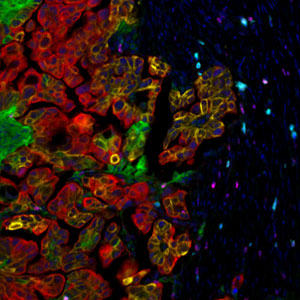Research in the field of epigenetics has grown at a rapid pace since the discovery of the first histone acetyltransferase enzymes 18 years ago. Since then, significant advances have been made in our understanding of the basic mechanisms of epigenetics (histone acetylation, histone methylation, chromatin remodeling and DNA methylation) and the impact of epigenetic deregulation on cancer, inflammation, metabolism, and neurological diseases. This impact on disease has been underscored by the recent identification of potential oncogenic mutations and losses of epigenetic regulators such as the histone methyltransferase EZH2 and chromatin remodeling protein ARID1A.
The chromatin IP (ChIP) assay is a widely used application and has provided a wealth of information regarding the localization and abundance of epigenetic marks and DNA-binding proteins across the genome in many cell types and tissues. In this webinar, Dr. Sayura Aoyagi will present on important factors to consider when performing a ChIP assay, including use of highly validated antibodies, optimized protocols and reagents, and the advantages of using enzyme-based chromatin digestion over sonication-based chromatin fragmentation.
Speaker

Sayura Aoyagi, PhD, Antibody Validation Scientist, Cell Signaling Technology
Sayura Aoyagi received her B.S. from Trinity College in Hartford, CT, where as an undergraduate she examined bacterial single-stranded DNA binding protein/DNA interactions using capillary electrophoresis. She then pursued her interest in understanding the complexities of protein-DNA interactions at the University of Rochester in Rochester NY, where she received her Ph.D. in Biochemistry in 2003. During this time, her work focused on the mechanisms of nucleosome remodeling by the ATP-dependent chromatin remodeling complexes SWI/SNF and Mi-2. This work was followed up by postdoctoral studies at the National Institutes of Environmental Health Sciences in Research Triangle Park, NC. Here, she investigated chromatin regulation and the transcriptional mechanisms that govern progesterone and glucocorticoid receptor mediated transcription. Sayura is currently an antibody validation scientist at Cell Signaling Technology, where she develops antibodies against targets related to epigenetics, chromatin regulation, RNA processing and nuclear receptor signaling.
Who Should Attend?
This webinar is ideal for academic and pharmaceutical researchers who are interested in using ChIP assays to explore how disruption in the normal control of epigenetics may influence cancer, inflammation, metabolism, and neurological diseases.
Xtalks Partner
Cell Signaling Technology
Cell Signaling Technology (CST) is a private, family-owned company, founded by scientists and dedicated to providing high quality research tools to the biomedical research community. Our 400+ employees operate worldwide from our headquarters in Danvers, Massachusetts, and our offices in the Netherlands, China, and Japan.
Media Partner
You Must Login To Register for this Free Webinar
Already have an account? LOGIN HERE. If you don’t have an account you need to create a free account.
Create Account




